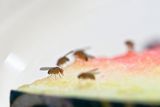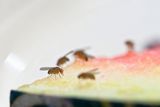Science
Researchers Uncover How Fruit Flies Transform Needs into Cravings

A recent study from the Champalimaud Centre has revealed fascinating insights into how fruit flies convert internal nutritional needs into focused cravings. When deprived of essential nutrients, these insects not only adjust their eating habits but also undergo changes in their sensory perception, specifically their sense of smell. This research sheds light on the complex relationship between physiological needs and sensory experiences.
To investigate this phenomenon, researchers explored the role of essential amino acids—vital building blocks of proteins that animals cannot synthesize on their own. The absence of even one amino acid can disrupt metabolic balance, prompting the brain to seek out protein-rich food. The study involved feeding fruit flies diets specifically lacking one of ten essential amino acids and monitoring genetic responses in their brains.
The results indicated that each deprivation produced distinct genetic changes, yet two particular smell-related genes—Or92a and Ir76a—were consistently activated when an amino acid was missing. This suggests a shared molecular pathway that connects nutrient deficiency to altered sensory perception.
Hunger Alters Behavior and Sensory Perception
The study highlighted how these genes are central to the behavior of hungry fruit flies. The Or92a receptor plays a crucial role in detecting diacetyl, a compound released by fermenting yeast, which serves as a primary protein source for the flies. Interestingly, when this receptor was disabled, the insects were still able to locate yeast but consumed less of it. This indicates that the sense of smell not only helps locate food but also influences how appealing it seems.
The second gene, Ir76a, responds to phenethylamine (PEA), a substance produced by bacteria found in foods like cheese and chocolate. According to Sílvia Henriques, co-first author of the study, “The flies weren’t being attracted to the chocolate itself—they were responding to the bacteria growing in those foods.” This underscores the flies’ evolutionary adaptation to use microbes as nutritional allies, enhancing their chances of survival in times of nutrient deprivation.
When deprived flies encountered live strains of Lactobacillus and Acetobacter, the neurons associated with these sensory pathways fired more vigorously, leading to increased feeding behavior. In contrast, dead bacteria did not elicit the same response, emphasizing the flies’ finely tuned sense of smell, which adapts according to their internal nutritional state.
Implications for Understanding Human Appetite
This research contributes to a broader understanding of how internal physiological states can reshape perception and behavior. It demonstrates that when nutrients are scarce, the brain does not merely react; it actively rewires its sensory systems to enhance the pursuit of necessary resources. In the case of fruit flies, hunger acts as a transformative catalyst, altering how they engage with their environment to fulfill their dietary needs.
The findings serve as a reminder that the connection between body and brain is dynamic, shifting in response to internal signals. This could have implications for understanding human appetite regulation and nutritional strategies, highlighting the complex interplay between our physiological needs and sensory experiences.
As scientists continue to explore these connections, the results from the Champalimaud Centre offer valuable insights into the underlying mechanisms of craving and behavior, not just in fruit flies but potentially across various species.
-

 Technology4 months ago
Technology4 months agoDiscover the Top 10 Calorie Counting Apps of 2025
-

 Health2 months ago
Health2 months agoBella Hadid Shares Health Update After Treatment for Lyme Disease
-

 Health3 months ago
Health3 months agoErin Bates Shares Recovery Update Following Sepsis Complications
-

 Technology3 weeks ago
Technology3 weeks agoDiscover 2025’s Top GPUs for Exceptional 4K Gaming Performance
-

 Technology4 months ago
Technology4 months agoDiscover How to Reverse Image Search Using ChatGPT Effortlessly
-

 Technology2 months ago
Technology2 months agoElectric Moto Influencer Surronster Arrested in Tijuana
-

 Technology4 months ago
Technology4 months agoMeta Initiates $60B AI Data Center Expansion, Starting in Ohio
-

 Technology4 months ago
Technology4 months agoRecovering a Suspended TikTok Account: A Step-by-Step Guide
-

 Health4 months ago
Health4 months agoTested: Rab Firewall Mountain Jacket Survives Harsh Conditions
-

 Lifestyle4 months ago
Lifestyle4 months agoBelton Family Reunites After Daughter Survives Hill Country Floods
-

 Technology3 months ago
Technology3 months agoUncovering the Top Five Most Challenging Motorcycles to Ride
-

 Technology4 weeks ago
Technology4 weeks agoDiscover the Best Wireless Earbuds for Every Lifestyle











